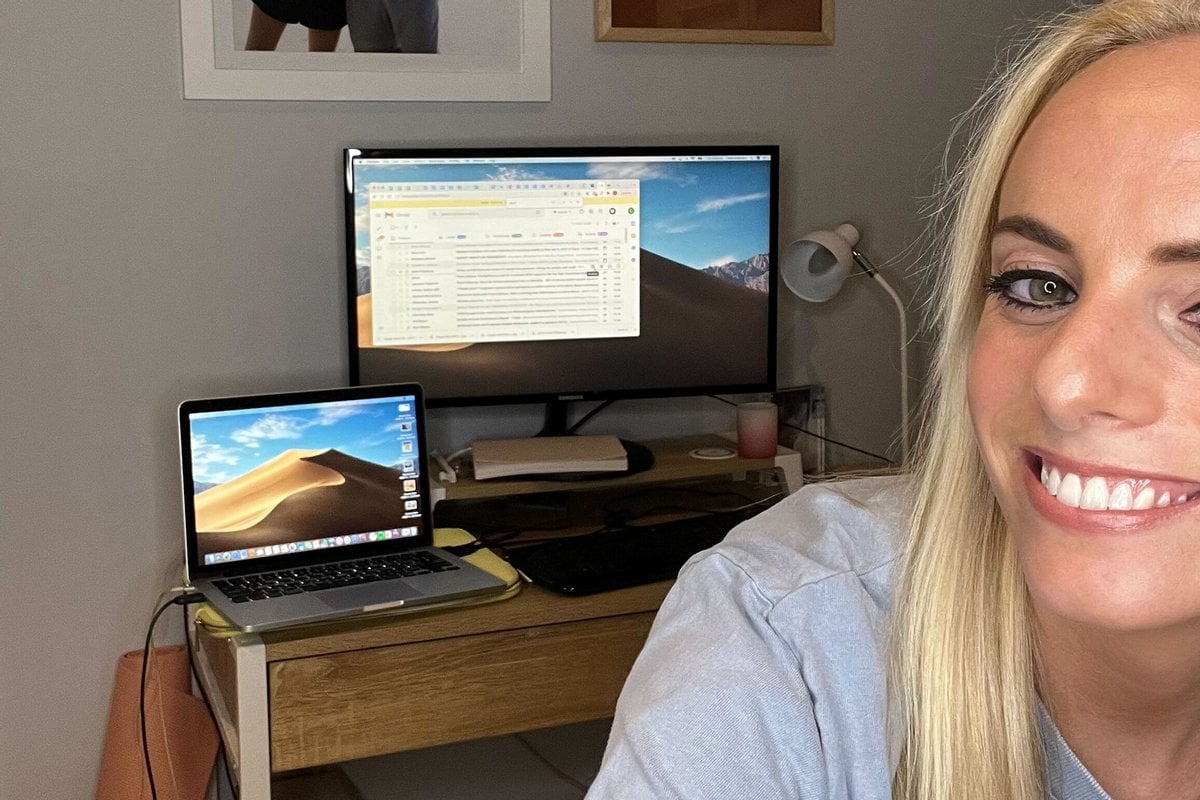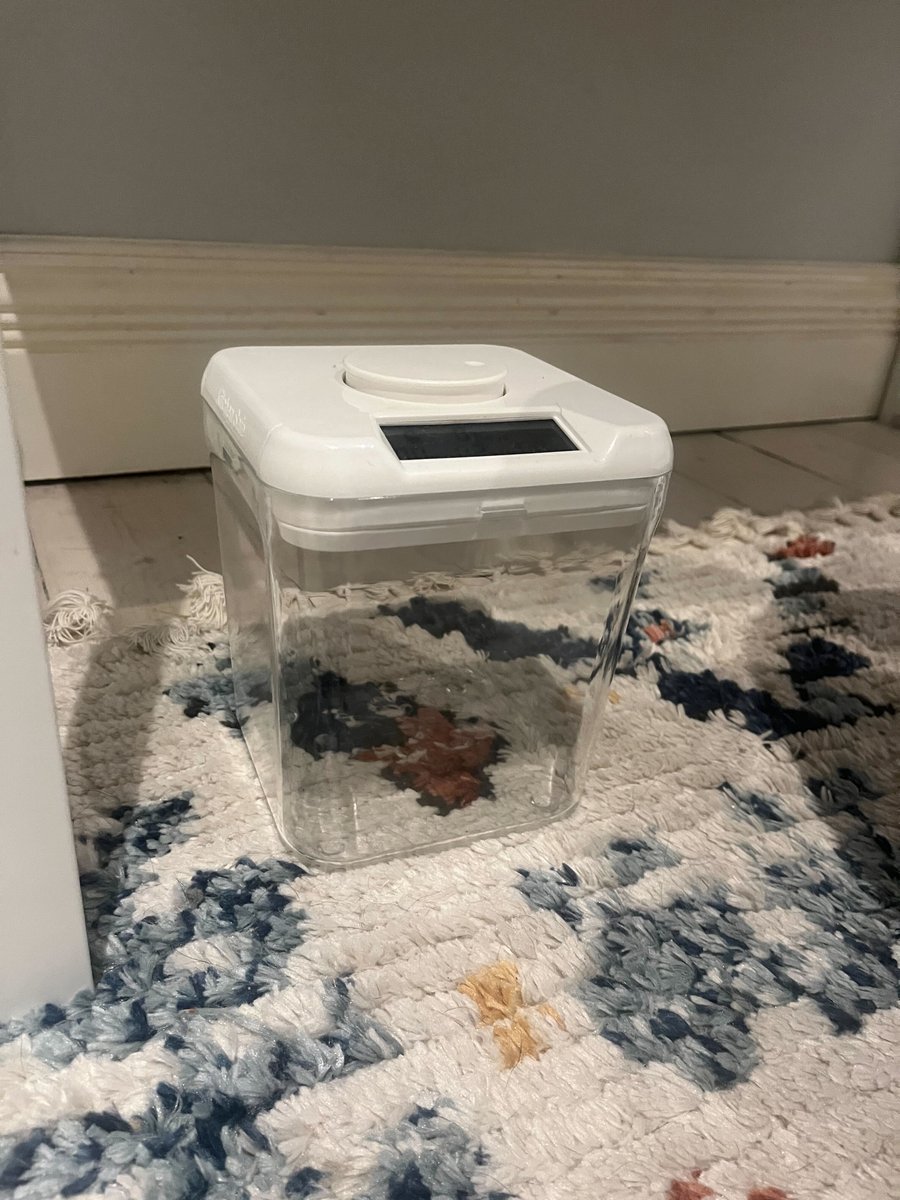
As I type this, I don't have access to my phone.
It's not broken. It's not in another room. It hasn't been confiscated by my partner, although sometimes I've considered asking him to take it hostage.
I can't use it, but I can see it. Right now, the screen is lit up, suggesting some sort of notification. Maybe a message from a friend or a calendar reminder or just a weird, unwanted pop up from an app I'd forgotten I even had.
No matter how much I want to, I can't check it. Because there's a thick, plastic box with a chunky white lid between myself and my screen. A lid that locks for a set time, because that container is a safe.
The digital time on the safe currently reads: 1:49:53. That's how long I have left before it makes a mechanical sound and gives me back my phone. At that point, I'll grab my phone immediately and scroll through mindlessly for at least 10 minutes, before feeling profound shame about how my relationship with it is like an addict with their drug. I need it. I'll do anything to justify it. And it's gradually, inarguably, ruining my life.
*****
Like a parasite, my phone sucks hours of my time every single day. Hours of stories and videos and sounds that represent everything and nothing at the same time.
Late at night, I sometimes get a sickening wave of clarity about the lost potential that's been stolen from me by this tiny, clever device. A device designed by people who understand my brain better than I do, and who know how to hack it for every moment of attention they can.
In his book Stolen Focus, Johann Hari argues that our ability to pay attention is collapsing for a number of reasons, all of which are more complex than we might expect. A huge factor, unsurprisingly, is Big Tech, and the way the leading tech companies (Facebook, Instagram, TikTok, Snapchat, Twitter, Gmail, and so on) are designed to keep us on them for as long as possible, because that's how they make ad revenue.
"What we are sacrificing," Hari writes, "is depth in all sorts of dimensions….
"Depth takes time. And depth takes reflection. If you have to keep up with everything and send emails all the time, there’s no time to reach depth. Depth connected to your work in relationships also takes time. It takes energy. It takes long time spans. And it takes commitment. It takes attention, right? All of these things that require depth are suffering. It’s pulling us more and more up onto the surface."
Hari puts forward a case for initiatives that will tackle our attention crisis at a population level, quoting Google engineer Tristan Harris who said, "You can try having self-control, but there are a thousand engineers on the other side of the screen working against you."
But he also devotes part of his book to individual techniques that can improve our focus. One of those - and one that worked for him personally - is the idea of the safe.
 What my safe looks like. Image: Supplied.
What my safe looks like. Image: Supplied.
"We can change habits," he writes. "The way we change a habit is by understanding what the internal trigger is, and making sure that there’s some kind of break between the impulse to do a behaviour and the behaviour itself."
The safe is that break. It's that barrier that stops me from acting on my impulse - an impulse so strong and so quick that I usually don't have a moment to interrogate it. And it means for an arbitrary and finite period, there's no temptation.
*****
My attention and focus have been gradually deteriorating over the last several years. I remember even noticing a difference between how I approached assignments at the beginning and the end of university - over those five years I'd become more distracted, and less able to concentrate on a task for a sustained period of time.
But it was the pandemic that fast-tracked my path to being permanently distracted.
TikTok emerged at just the right (well, wrong) time, providing a constant stream of short videos that felt harmless. It made us feel connected at a time of unprecedented isolation, and it allowed us to laugh. For a while there, many of us were doing TikTok dances in our homes, thankful for a platform that crossed age and interest barriers.
When you wanted the news, the short updates were there. When you wanted to cringe at Hollywood celebrities earnestly singing 'Imagine', there were countless spoofs. When you wanted tiny bits of joy in your day, there were songs and impersonations and clips from stand-up specials, promising that you could always be entertained, no matter what time it was or what else was going on.
And then the algorithm got really, really... smart. It tested you. For every second of attention you did or didn't give a piece of content, it learnt more about how to keep you. Before we knew it, we had a video-based social media platform that had become highly personalised. If we'd felt distracted by our phones before the pandemic, now we were chained to them.
Working from home added another layer of complexity. The divide between work time and our own time became blurred, until we found ourselves going for walks in the sunshine with our necks craned towards the screen in our hands. Was there an email? A message? Did someone need us, in which case we would of course reply immediately to show we were working. Always. We became constantly available - as long as we had a phone, we had our workload with us.
In April 2021, a study found the average Australian was spending 5.5 hours per day on their phone - the equivalent of 16 years over a lifetime.
I'm embarrassed to say my screen time is higher than that. It regularly exceeds 6 hours, and while I try to justify it by arguing that I use my phone for work emails and reading the news and sharing content, the fact is that there is no good reason for me to be on my phone that much.
So this year, I invested in the safe.
*****
When I put my phone in the safe, I'm overcome by one, unmistakable feeling.
Relief.
For one hour, or two hours, or four hours (that's my record), I simply can't look at my phone. I'm not beholden to it. Checking notifications isn't an option, responding to messages isn't possible, I'm going to miss calls and updates and comments, and I have the perfect excuse.
When I shared my 'hack' with my team at work, there was a common concern: what if there's an emergency? What if your mum is trying to call or someone urgently needs to get in contact? What if you're needed?
That has actually happened. Twice.
Once, my mum was calling with bad news. Of course I was frazzled and apologetic for missing her original call, but the nature of the news hadn't changed in the time it had taken for the safe to unlock and give me back access to my phone. We have an illusion of immediacy - that we need to know everything straight away. But we don't. Not really.
The second time, I had missed an appointment that would've usually shown up as a notification on my phone. It was only when I took it out an hour later that I realised I had missed calls, and I felt awful.
But what's the cost of never putting the phone away? If we're constantly trying to avoid any inconvenience that could come from not having uninterrupted access to our phones, aren't we just going to be staring at them non-stop? Not concentrating or creating or thinking deeply or solving problems, in the fear that we might... miss something?
I want to increase the amount of time I lock my phone away, aiming for several hours at a time. While I find myself procrastinating the act of actually putting it in the safe, once it's in, I don't regret it for a second.
It's the only way I've found to combat my fractured attention span, and the only way I'll be able to answer the question: What would we do if we gave ourselves back several hours each day - the ones our phones have stolen?
For more from Clare Stephens, you can follow her on Instagram and TikTok.
Do you often find you need a pick-me-up to get through the day? Take our survey now to go in the running to win a $50 gift voucher.
